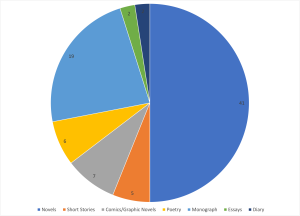This is a conversation I have had many times. The person I’m speaking with will ask me about a reality TV show, or some character or episode or event having to do with that show. I will say that I don’t watch the show, and don’t know anything about it. The person will then, immediately and usually at least a little defensively, assure me that they only watch to relax, to “turn their brain off,” or when they want some “brain candy.” In other words, they want me to know that they know the show is “stupid,” or trashy, or otherwise not particularly edifying. They want to establish that this kind of thing is an exception to their “normal” patterns of cultural consumption.
I tell this story because I want to make it clear that I do not dislike reality TV because it is dumb, nor do I think you are dumb for watching it. I get the appeal of stupid. I like all kinds of stupid stuff. I love the movie UHF; it does not get dumber than this. I also understand the appeal of, or even the need for, undemanding entertainment at the end of a long day. I do not feel like reading War and Peace after work either (especially since my job is essentially to read hard things all day, and then write similar things). So it’s not any of those things.
I should also say that my problem with Reality TV really applies to certain kinds of shows. It does not really (usually) apply to shows like Project Runway or Top Chef, in which people who have a talent or skill are competing on that skill. (Though it also sometimes seems that the producers of these kinds of shows would like to make them more like the shows I don’t like). It applies most of all to shows like Big Brother or Jersey Shore, in which we simply aim a camera at a group of people and watch what they do.
First of all, watching these shows makes me unhappy. I do not enjoy it at all; I feel bad when I watch. I feel neither guilt nor pleasure; I feel progressively more depressed and angry.
This is because, by design, basically everybody on these shows is a horrible person— selfish, self-centered, ignorant, greedy, shallow, manipulative, and dishonest. If they are not a horrible person, they are usually either not very bright or extremely naive, so that they will be totally unable to deal with the horrible people.
So, watching horrible people be horrible to each other is an unpleasant experience in itself. But more than that, what upsets me the most is why I think these shows are so full of horrible people (and, as everybody more or less realizes by now, are edited and shaped to make the people look as bad as possible— to maximize the impression of horribleness). Obviously, it has something to do with the (perceived) distance between them and us, but I don’t think we necessarily think enough about how our perception of that distance is being manipulated by the way these shows are put together.
But I think that these shows also look the way they do because the people who make them think that we want to feel superior to other people. Probably some of us do, and probably for a lot of us that in indeed part of the appeal. But keep in mind that reality shows are products, and they are developed as products based on somebody’s notion of what will sell, and why. The underlying theory of these shows, it seems to me, is that the most enjoyable thing for us as viewers is to think badly of other people, to dislike other people. The only way to guarantee that response it to choose the most dysfunctional people we can find, and then edit the presentation of them to maximize their worst qualities. The people on Jersey Shore are not actually doing anything inherently entertaining; they are just unpleasant. But they are— again by deisign— unpleasant enough to make us genuinely dislike them. Therefore, it seems to me that the aim of the show is precisely to provoke this reaction, on the assumption that we enjoy disliking others, that we are just sitting in our living rooms waiting for someone to scorn.
Again, I’m not saying this tendency doesn’t exist in people. What I find disturbing is that these shows seem clearly designed to capitalize on this inclination. In other words, the producers designing shows by thinking the worst of you, the viewer. They are saying to the advertisers who are their clients: “You should buy ads on this show because our viewers are the kind of people who want to believe that other people are awful, and the show will give them that opportunity.” They aim at the lowest common denominator, but not (only) in intellectual terms— in ethical terms as well. These shows suggest that the people who make them think we are not (just) stupid, but kind of awful ourselves, and I do not like being treated this way. So that is why I don’t like Reality TV.


